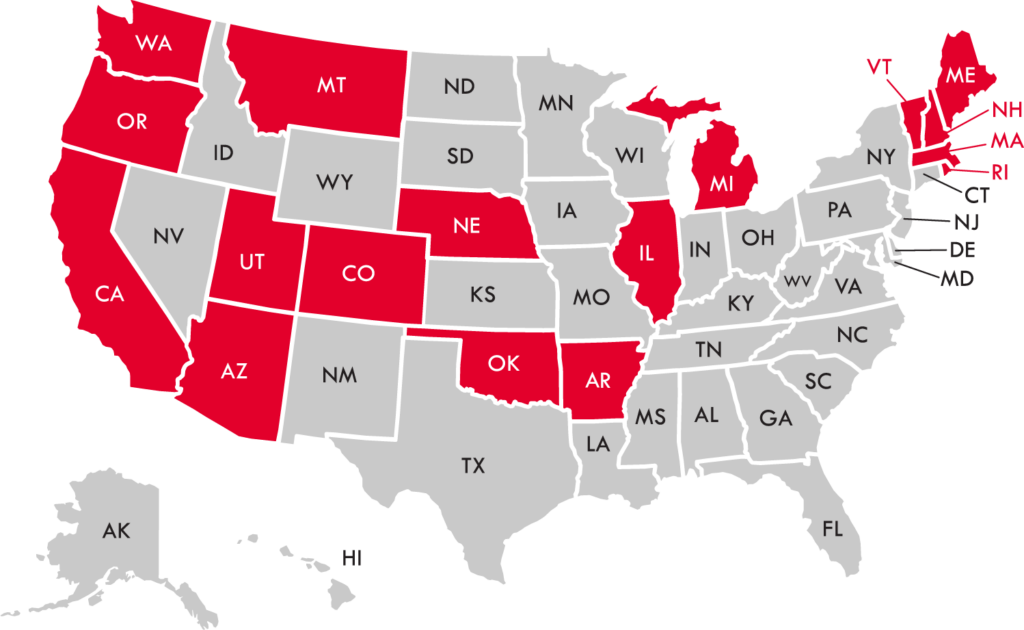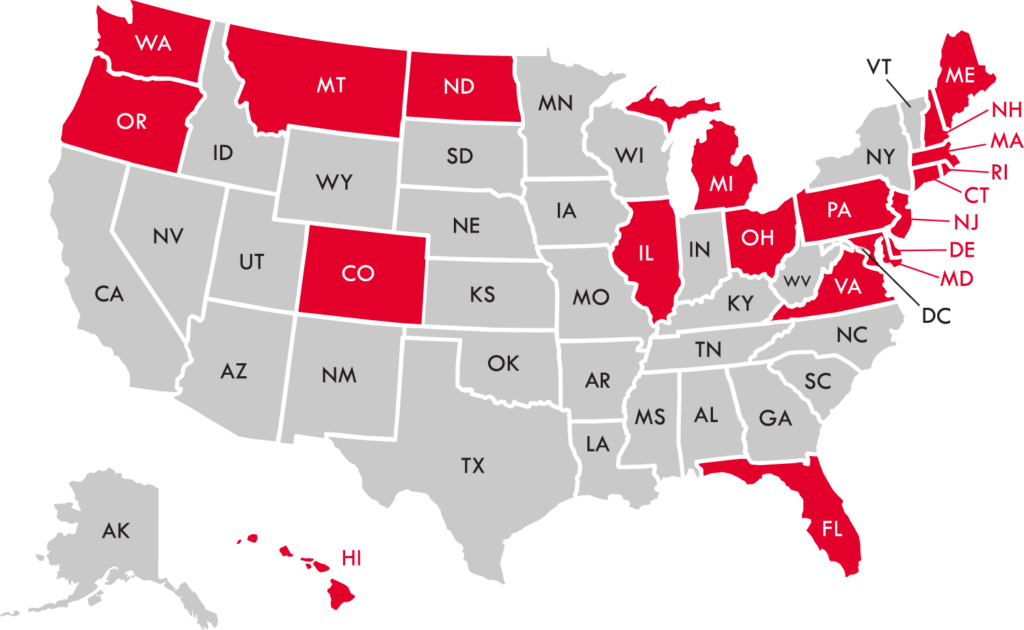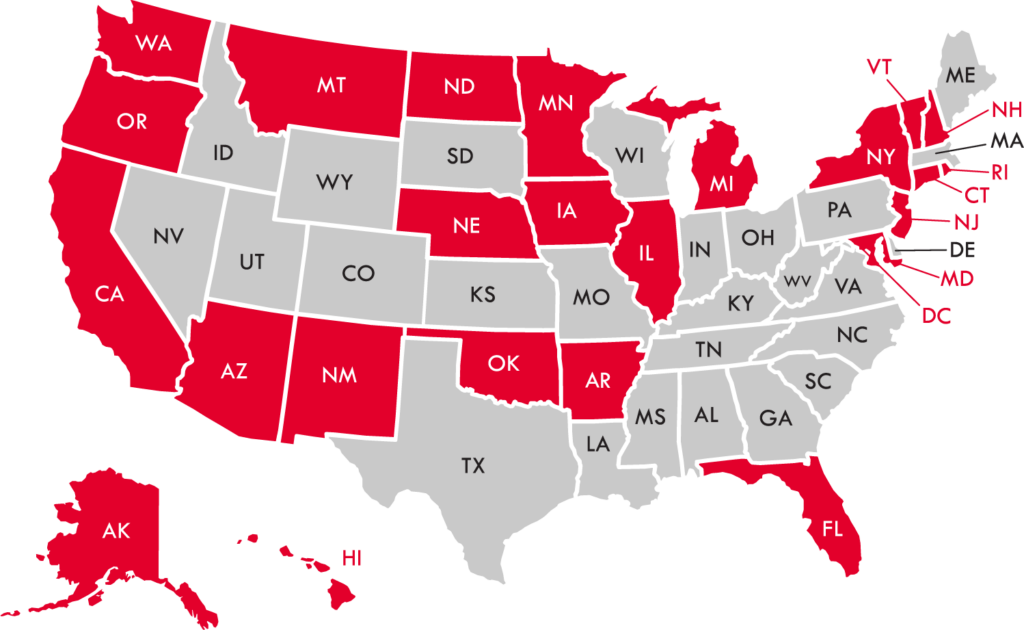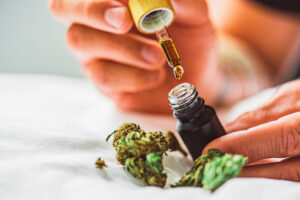As of the time of this publication, medical cannabis is legal in 37 states. If the trends of cannabis legalization continue, we can expect more states to legalize medical cannabis in the coming years. Since laws differ between state lines, traveling with medical cannabis comes with some legal nuance. Medical cannabis reciprocity is where medical cannabis can be bought when you have a medical card from another state.
Can I Use My Medical Marijuana Card in Another State?
As of September 2022, medical cannabis reciprocity does not always mean visiting patients have access to medical cannabis. Every state has their own laws, which means reciprocity regulations are determined by the state government, and is sometimes the subject of dispensary discretion.
States that accept out-of-state medical cannabis cards typically have pro-cannabis laws that include:
- Cannabis reciprocity
- Temporary licenses for non-permanent residents and visitors
- Adult use laws
Traveling medical patients may face criminal penalties for possessing or buying cannabis products. The best way to avoid legal consequences it to know which states allow interstate medical cannabis products before you travel.
States that offer medical cannabis reciprocity in some form include:
- Arizona
- Arkansas
- California
- Colorado
- Illinois
- Washington, D.C.
- Maine
- Massachusetts
- Michigan
- Montana
- Nevada
- New Hampshire
- Oklahoma
- Oregon
- Rhode Island
- Vermont
- Utah
- Washington



Possess-but-Not-Purchase States
In some states, a medical card lets you keep out-of-state medical cannabis on your person, but you cannot purchase cannabis in the state. Federal cannabis laws differs from those of individual states, and traveling between states with cannabis is still a federal offense. Though cannabis is legal in several states, cannabis use and possession is illegal on a federal level.
Temporary Visitor States
Some states with medical cannabis reciprocity allow cannabis sales with an visitor cannabis medical card, which often comes with an application fee. If your stay lasts longer than a state-designated amount of time, you will need to apply for a new medical card, either as a visitor or as a permanent resident. The temporary license lasts anywhere from 30 days to six months, depending on the state.
Medical Card Reciprocity States
To know the legality of interstate travel with medical cannabis, knowing the individual state laws is a great place to start. These states have medical cannabis reciprocity in place, in some form:
Arizona
Arizona has medical cannabis reciprocity laws, with some limitations. To buy cannabis with an out-of-state card, you must qualify as a “visiting qualifying patient.” This means you must have an out-of-state medical cannabis card, with a medical condition that satisfies Arizona’s medical cannabis requirements. These conditions include:
- Cancer (to alleviate pain, nausea, etc.)
- Glaucoma
- HIV/AIDS
- Hepatitis C
- Amyotrophic lateral Sclerosis
- Crohn’s disease
- Alzheimer’s disease
- Wasting syndrome (cachexia)
- Chronic pain
- Nausea
- Epilepsy
- Multiple sclerosis
- Post-Traumatic Stress Disorder (PTSD)
Arizona allows medical cannabis patients (or their caregiver) to purchase up to 2.5 ounces every two weeks.
Arkansas
Arkansas allows out-of-state medical cannabis patients to buy medical cannabis if they submit a visiting patient form and show their state’s medical card. Those with a valid out-of-state medical recommendation and card can legally purchase medical cannabis in Arkansas, provided they fill out a visiting patient form and can provide proof of their out-of-state medical cannabis registration, which comes with a $50 application fee. If you qualify, you can get up to 2.5 ounces every two weeks.
California
In California, anyone 21 or older can buy recreational and medical cannabis with government-issued ID. You can hold up to 28.5 grams of flower and five grams of cannabis concentrates.
Colorado
Colorado allows anyone 21 or older with state-issued ID to buy medical or recreational cannabis. Non-residents can possess one ounce of cannabis flower and eight grams of cannabis concentrates.
Illinois
Illinois is one of the states that does not allow medical cannabis reciprocity. Out-of-state visitors aged 21 and older can possess 15 grams of cannabis, 250 milligrams of infusions and 2.5 grams of concentrate.
Washington, D.C.
The District of Columbia (Washington, D.C.) allows medical cannabis from specific states, including:
- Colorado
- Connecticut
- Delaware
- Florida
- Hawaii
- Illinois
- Maine
- Maryland
- Massachusetts
- Michigan
- Montana
- New Hampshire
- New Jersey
- North Dakota
- Ohio
- Oregon
- Pennsylvania
- Rhode Island
- Virginia
- Washington



If your state is not included for reciprocity, you can legally hold up to two ounces of flower, but not concentrates. Consuming cannabis on federal land is strictly prohibited, so only use cannabis on private property.
Maine
Though Maine allows both medical and adult use (sometimes called “recreational cannabis”), the state only provides medical cannabis reciprocity from the following states:
- Alaska
- Arizona
- Arkansas
- California
- Connecticut
- Florida
- Hawaii
- Illinois
- Iowa
- Maryland
- Michigan
- Minnesota
- Montana
- Nevada
- New Hampshire
- New Jersey
- New Mexico
- New York
- North Dakota
- Oklahoma
- Oregon
- Rhode Island
- Vermont
- Washington
- Washington, D.C.



Massachusetts
Massachusetts permits anyone over the age of 21 to use and possess cannabis. Adult use and medical users can possess a maximum of one ounce of flower and five grams of concentrates if they have valid government-issued ID.
Michigan
Michigan legalized adult use and medical use, but out-of-state medical sales are at the dispensaries’ discretion. Individual dispensaries get to decide if they recognize an out-of-state medical cannabis card. Adults aged 21 years or older can possess up to 2.5 ounces of flower or 15 grams of concentrate.
Montana
Montana allows medical cannabis reciprocity, but South Dakota is the only state bordering Montana that allows cannabis use. Adult use is legal in Montana for those 21 or older. Possession is limited to one ounce of cannabis.
Nevada
Nevada allows cannabis reciprocity with every state. Adults 21 or older can hold one ounce of flower, edibles and topicals, and 3.5 grams of concentrate. Medical patients can hold up to 2.5 ounces of flower, edibles and topicals, and 3.5 grams of concentrate.
New Hampshire
New Hampshire does not allow out-of-state medical cannabis purchases, but medical patients can possess up to two ounces of cannabis flower. Medical patients are only allowed to hold cannabis from other states if they have the same qualifying conditions. These conditions include:
- Amyotrophic lateral sclerosis (ALS)
- Alzheimer’s disease
- Autism
- Cachexia (wasting syndrome)
- Cancer
- Chemotherapy-induced anorexia
- Chronic pain
- Crohn’s disease
- Ehlers-Danlos syndrome
- Elevated intraocular pressure or glaucoma
- Epilepsy
- Hepatitis C
- HIV/AIDS
- Insomnia
- Lupus
- Multiple sclerosis
- Muscular dystrophy
- Muscle spasms
- Nausea
- Opioid use disorder
- Pancreatitis
- Parkinson’s disease
- Post-Traumatic Stress Disorder (PTSD)
- Seizures
- Spinal cord injury or disease
- Traumatic brain injury
- Vomiting (moderate to severe)
Oklahoma
Oklahoma allows out-of-state medical cannabis cards. Out-of-state medical cannabis patients need to apply for a temporary license for retail purchases, along with a $100 fee. This license is valid for 30 days, but can be renewed. If your temporary license is approved, you can possess:
- At home: Up to eight ounces of flower
- On your person: Up to three ounces of flower
- Up to one ounce of concentrate
- Up to 72 ounces of edibles
Oregon
Oregon does not have medical cannabis reciprocity, but recreational cannabis is legal throughout the state. Anyone 21 or older can purchase cannabis with a valid government-issued ID. Adults can possess up to:
- One ounce of flower
- 16 ounces of edibles
- 72 ounces of tincture
- one ounce of concentrate
- 16 ounces of topicals
Rhode Island
In Rhode Island, medical patients need to present their their out-of-state medical card with a government-issued ID card. Out-of-state patients can possess the same amount of medical cannabis as in-state patients at 2.5 ounces of flower.
Vermont
Vermont legalized cannabis for recreational use, so adults 21 and older can carry up to an ounce of cannabis. As of this article’s publication, medical patients are only allowed to buy from state-licensed medical dispensaries.
Utah
Utah requires medical patients to meet one or more of the state’s qualifying conditions for cannabis reciprocity. Those qualifying conditions include:
- Alzheimer’s disease
- Amyotrophic Lateral Sclerosis (ALS)
- Autism
- Cachexia (wasting syndrome)
- Cancer
- Crohn’s disease
- Epilepsy
- HIV/AIDS
- Multiple sclerosis
- Ulcerative colitis
- Terminal illness (six months to live or less)
- Post-Traumatic Stress Disorder (PTSD)
- Persistent nausea (unless it’s from pregnancy or cannabis hyperemesis syndrome)
- Seizures
Washington
In Washington state, adults 21 years old or older can buy cannabis products from retail dispensaries. Adults can have up to one ounce of cannabis flower, 16 ounces of edibles, 72 ounces of tinctures, or seven grams of concentrate.
Flying Across State Lines with Cannabis
Flying across state lines on a plane with cannabis, even between states with medical cannabis reciprocity laws, is not legal. Cannabis products are federally prohibited on planes, with some caveats.
The Transportation Security Administration (TSA) says the only cannabis products allowed on a plane are products with 0.3% THC or less, along with FDA-approved medications. Airports fall under the jurisdiction of the federal government, which means cannabis products with over 0.3% THC are prohibited. When you go through a TSA checkpoint, you have crossed into a federally-controlled part of the airport that extends to the plane and even its airspace.
Connect with Happy Valley
If you are flying into Boston, be sure to visit our East Boston location to find the best cannabis products locally. We are just a mile north of Boston Logan International Airport. If you would like up-to-the-minute news delivered directly to your inbox, be sure to join our email list and become a Happy Valley Insider. To sign up for our newsletter, scroll to the bottom of the page and enter your email address in the Stay Connected section.




